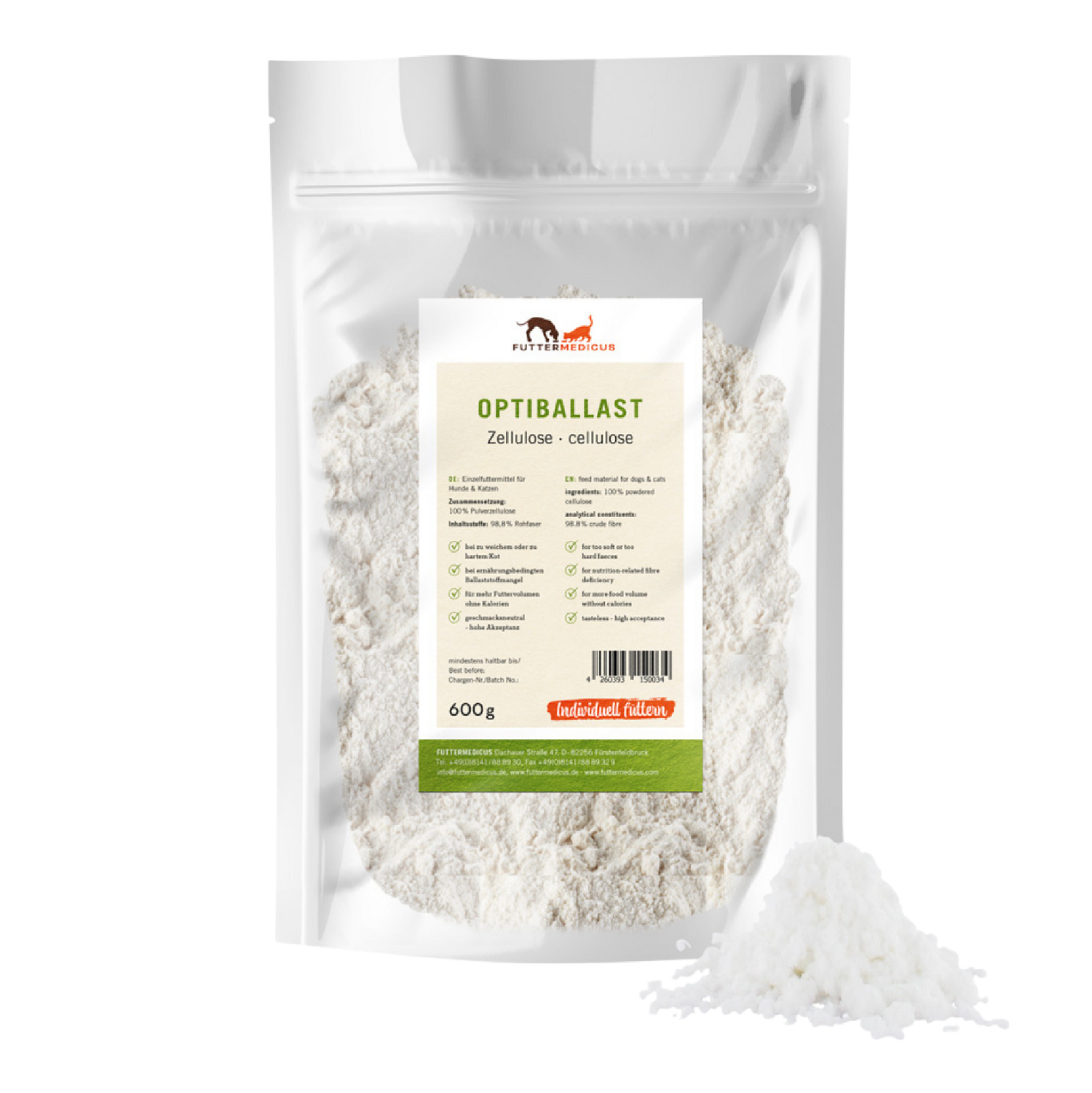Futtermedicus
Optiballast Cellulose
- A few left in stock!
Order and get 26 reward points
Your are not part of Ruby Reese Rewards? Start earning points by signing up now.
Description
Dietary fibre for dogs and cats
- extracted form beech wood
- low-calorie filler
- good for soft and too hard faeces
- neutral taste
Optiballast – a taste-neutral dietary fibre
Complimentary supplement for dogs and cats
Futtermedicus Optiballast Cellulose consists of the plant fiber cellulose. In nutrition, cellulose is classified as a dietary fiber. Although it is indigestible for dogs and cats and provides no nutritional value, it plays an important role in maintaining healthy digestion!
Fibers such as cellulose stimulate intestinal movement when the stool is too hard and, in low-fiber diets, can replace the vegetable portion. Conversely, in cases of soft stool, cellulose helps firm it up due to its high water-binding capacity.
If your pet refuses to eat vegetables or receives only meat and carbohydrates, cellulose provides the missing dietary fiber otherwise found in a balanced dog or cat diet.
Futtermedicus Optiballast Cellulose
The Futtermedicus cellulose feed supplement is suitable for both dogs and cats. It can be used to supplement home-cooked meals, raw feeding, or commercial pet food.
Optiballast Cellulose contains pure cellulose and is well accepted by dogs and cats!
Feeding Instructions
Basic Recommendation
0.5–1.0 g per kg body weight per day
1 heaped teaspoon = approx. 1–1.5 g
1 heaped tablespoon = approx. 3–4 g
Feeding Tips
Start with a small amount of cellulose powder and gradually increase it to the target amount over 4–5 days.
This allows the intestines and gut bacteria to adapt and make optimal use of the fiber.
If the full amount is given right away, the stool consistency may temporarily worsen due to the sudden increase in fiber content.
Let the fibers soak in water beforehand, then mix them thoroughly into the food.
You can find guidance on the required water quantity depending on the powder amount in the table below.
The amount of feed cellulose your pet tolerates can vary individually.
The dosage can be increased up to a maximum of 1 g per kg body weight per day.
As soon as the stool becomes softer, the individual tolerance limit has been reached — in this case, reduce the amount by half a teaspoon.
Recommendation for Different Weight Classes
| Body weight (kg) | Minimum amount per day (g) | Maximum amount per day (g) | Water quantity (ml) |
|---|---|---|---|
| 3–4 | 1.5–2 | 3–4 | 20–40 |
| 5–10 | 2.5–5 | 5–10 | 25–100 |
| 15–20 | 7.5–10 | 15–20 | 75–200 |
| 25–30 | 12.5–15 | 25–30 | 125–300 |
| 30–40 | 15–20 | 30–40 | 150–400 |
| 50–60 | 25–30 | 50–60 | 250–600 |
Individual and Balanced Nutrition for Dogs
Would you like a personalised nutrition consultation for your dog?
Do you want to know how to specifically support your dog's digestion? Learn more here or contact us
Ingredients
Nutritional Breakdown
Feeding instruction
Couldn't load pickup availability



